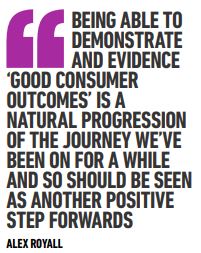 In this latest '5 Minutes With' interview, I ask Alphera Financial Services director Alex Royall about some of the work UK motor retail is doing ahead of changing FCA regulation, including affordability checking when a consumer wants to buy a car.
In this latest '5 Minutes With' interview, I ask Alphera Financial Services director Alex Royall about some of the work UK motor retail is doing ahead of changing FCA regulation, including affordability checking when a consumer wants to buy a car.
There has been more of a focus on affordability in the finance and insurance (F&I) field in recent years, driven largely by a very active regulator. With base interest rates at their highest level in more than a decade, credit more expensive, and many people feeling the squeeze, what does the motor finance industry need to prioritise?
All of this means it is more important than ever to ensure consumers can afford their finance payments, not just right now, or at the point of approval, but also in the future, over the term of their agreement. The simplest way of doing this is by conducting detailed affordability checks at the time of purchase and, crucially, providing the lender with the fullest picture of the individual’s financial circumstances, allowing them to forecast the customer’s affordability across the duration of the proposed credit agreement.
It’s not an exact science – the task is even more complex given the volatility of the macroeconomic situation – and, as we saw in the COVID pandemic, individuals are affected very differently and some hit harder by market-specific or general economic downturns. However, each lender has an obligation for responsible lending, so having the fullest understanding of a customer’s incomings, outgoings and financial commitments ensures that the best lending decisions are made on all the information available.
Retailers are having to get used to delving deeper into a customer’s financial position, but some have told AM they remain uncomfortable about probing for sensitive information as they’re a car dealership, not a bank. What advice can you give them?
Lenders have to ensure that they make well-informed decisions about a specific individual’s ability to maintain their financial commitments over a defined multi-year period. We need to consider the full 360-degree situation in regard to their outgoings and their resilience to the evolving economic climate. So, the better the information and data provided by the customer – more often than not via a broker or retailer – into the underwriting process, the more robust the checks that can be conducted and the quality of the lender’s decision-making. Ultimately, this leads to greater protection for the consumer in the medium-to-long-term, although we all know that, in the short term, a refusal for credit – or more likely the refusal for the full amount a customer is seeking to borrow – isn’t an easy conversation.
 But, we at Alphera understand the importance of these vital and often difficult conversations, so we work hard with our partners to ensure that our lending is designed to develop longterm, sustainable customer relationships and that consumers understand any rationale for lending decisions is based on achieving good customer outcomes over the long run.
But, we at Alphera understand the importance of these vital and often difficult conversations, so we work hard with our partners to ensure that our lending is designed to develop longterm, sustainable customer relationships and that consumers understand any rationale for lending decisions is based on achieving good customer outcomes over the long run.
We’ve seen some growth in personal contract hire (PCH) in recent years, but personal contract purchase (PCP) still dominates, doesn’t it?
As well as affordability checks, choosing the right product for the customer is vital. The majority of business that Alphera writes is for used cars, where PCP remains the finance product of choice for most customers. PCPs provide consumers with specific guarantees, such as a guaranteed future value for the vehicle (in line with fair wear and tear guidelines), and a high degree of certainty through fixed monthly payments over the desired timeframe.
As the effects of inflation and the cost-of-living continue to bite, these features of PCP provide customers with some peace of mind that, despite bills and other outgoings rising, their monthly vehicle finance payment will remain the same throughout the agreement term and that the vehicle’s future value is guaranteed. Of course, these contractual ‘guarantees’ in our PCP product also require commitments from the customer – in terms of continuing to make their monthly repayments, to maintain the vehicle and adhere to fair ‘wear and tear’ standards, as well as stick to agreed term and mileage, so it’s a two-way street.
Read AM's latest Finance & Insurance spotlight report here.
With the Financial Conduct Authority (FCA) Consumer Duty coming in this summer, won’t dealers be looking to their finance partner for more support?
It is absolutely the responsibility of the lender to determine the customer’s financial resilience – it’s an essential, foundational piece of ‘knowing your customer’ and ‘treating customers fairly’ – but in the modern, interconnected sales process this is often reliant on the transparency and openness of both the broker or retailer, as well as the endcustomer that we all serve and who is ultimately responsible for repayment of the borrowing.
 Are you happy with the standard of conversations being had at the point of sale?
Are you happy with the standard of conversations being had at the point of sale?
At Alphera, we work closely with our partners and the Institute of the Motor Industry (IMI) to improve professional standards in automotive F&I, updating processes and approaches to affordability. As well as making sure that the correct processes are followed and managed, we’re also evaluating how best to handle the delicate conversations and discussions around affordability to manage customer expectations.
At this time, salespeople should be having honest and frank discussions with their customers about affordability and why it is in their best interest should their finance application be rejected or amended by the lender. With transparency comes trust; by handling it right and ensuring a customer doesn’t sign up to finance that puts too much stress on their financial means, a broker or retailer is more likely to be able to build trust and a long-lasting relationship with that customer.
What impact will the FCA Consumer Duty have on motor retailers?
It’s difficult to characterise the approach of the whole industry to Consumer Duty, as each lender has been looking at their own implementation plans and the implications for their own businesses, distributors and business partners.
For many of us in the industry it’s part of a wider, progressive shift over the past few years with ‘treating customers fairly’ and ‘know your customer’ – so achieving and being able to demonstrate and evidence ‘good consumer outcomes’ is a natural progression of the journey we’ve been on for a while and so should be seen as another positive step forwards.
What is Alphera doing to support the retailers in preparing and managing the likely impacts?
From an Alphera perspective, I’m confident that we’ve got the right plans in place and we’ve been engaged with our partners on the changes since the announcement last summer. We’re working through the precise details with our partner network in terms of the processes and procedure changes required to meet our mutual obligations but we’re incredibly pleased with the positive and proactive reaction of our partners to the changes.
For Alphera and our partners, it’s a continuum of progressive regulatory change, so it’s an evolution of the journey we’ve been on for a few years with the FCA, rather than a revolutionary shift.






















Login to comment
Comments
No comments have been made yet.